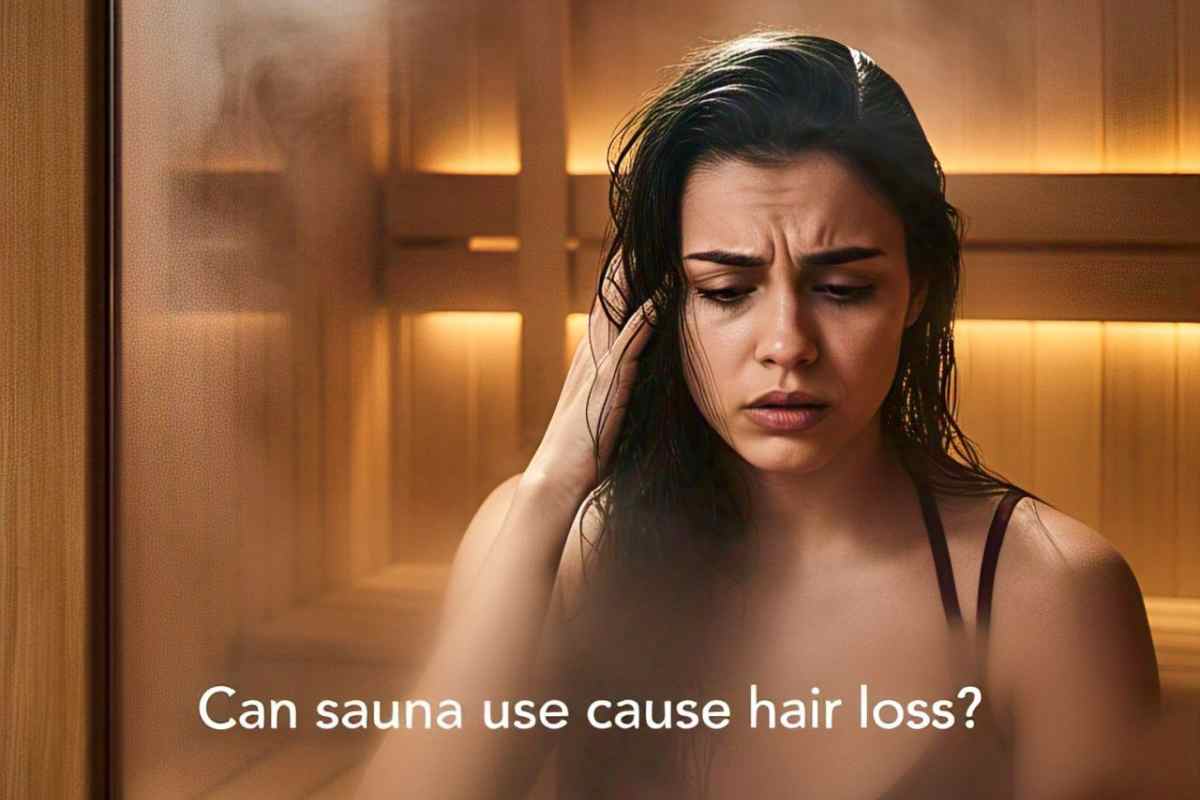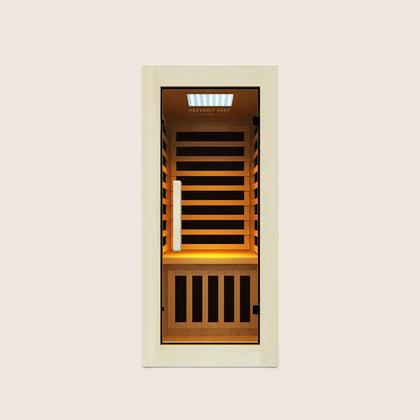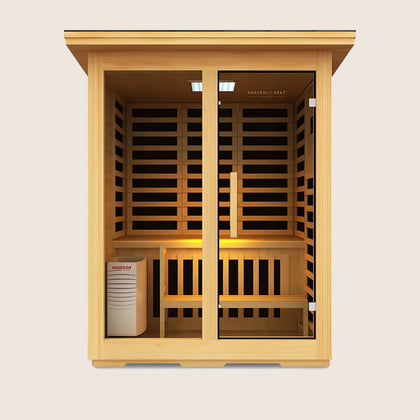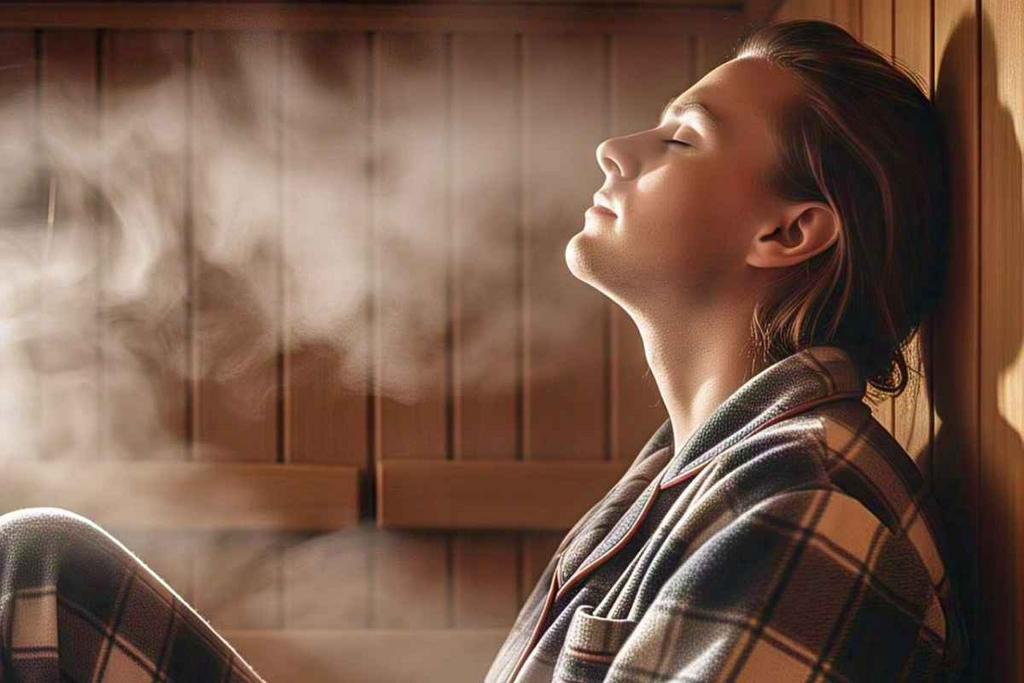Can Sauna Use Cause Hair Loss? Understanding the Effects of Infrared Saunas on Hair Health and Growth

Table of contents
Worried that sauna use might be causing your hair to thin? The intense heat and sweating in saunas can lead to scalp irritation, dehydration, and potential hair loss.
But don't panic, there are ways to protect your hair while enjoying the benefits of infrared saunas.
In this post, we will explore how saunas affect hair health and share tips to minimize any risks.
Key Takeaways:
Infrared saunas are gentler on hair compared to traditional saunas, reducing the risk of dryness.
Protect your hair by covering it or using a deep conditioner before sauna use.
Heat exposure can weaken hair over time, so moderation is key to prevent damage.
Hydrate your hair with a nourishing conditioner or deep treatment after sauna sessions.
Avoid direct heat exposure by sitting away from the sauna heater and tying long hair in a loose bun.
For colored or chemically treated hair, use heat-resistant caps or towels to prevent damage and fading.
What is Hair Loss ?
Hair loss, or alopecia, is a condition in which the normal hair growth cycle is disrupted—resulting in excessive shedding and inadequate regrowth. According to the Cleveland Clinic , while it’s typical to lose up to 100 hairs a day, hair loss becomes a concern when more strands fall out and fewer grow back. It can affect the scalp or the entire body and occurs in both adults and children.
Primary causes of hair loss include:
Genetics: Hereditary hair loss, known as androgenic alopecia, is the most common type and affects both men and women.
Autoimmune disease: Alopecia areata causes the body to attack hair follicles, leading to patchy loss.
Stress or trauma: Telogen effluvium follows physical or emotional stress, prompting sudden shedding.
Medical treatments: Chemotherapy can trigger rapid hair loss (anagen effluvium).
Hormonal changes: Pregnancy, childbirth, menopause, or thyroid disorders can disrupt hair cycles.
Nutritional deficiencies: Low iron or protein intake may impair hair growth.
Haircare habits: Tight hairstyles and chemical treatments can damage follicles.
Hair loss can impact self-esteem, daily routines, and mental health. However, treatments such as topical medications, hair transplants, and platelet-rich plasma (PRP) offer hope. Embracing supportive communities and protective hairstyles can also help individuals feel confident as they navigate this condition.
Introduction: How Saunas Affect Your Hair
- Sauna heat helps improve blood flow to the scalp: The warmth from saunas increases circulation, which can support hair growth.
- Too much sauna heat can make hair dry and weak: Frequent use without care may cause your hair to become brittle and fragile.
- Regular sauna sessions might weaken your hair roots: Over time, the heat can affect the strength of hair follicles.
- Sauna heat can cause scalp dryness and flakes: The warmth may irritate your scalp, leading to itchiness and flakiness.
- Cover your hair or use conditioner before sauna to protect it: Using a hair cover or deep conditioner helps keep your hair safe from damage.

Other Therapies that help with Hair Loss
Low-Level Laser Therapy
Low-Level Laser Therapy (LLLT) is a popular, drug-free option that helps fight hair loss by waking up the hair follicles and pushing them into the growth phase.
It works by using gentle red light to boost energy in the cells, which helps hair grow thicker and stronger.
One review of studies found that , LLLT helped both men and women grow more hair, even in cases like chemo-related hair loss.
Another study , in China, showed even better results when people combined a laser helmet with minoxidil, leading to thicker hair in just 24 weeks.
Scalp microneedling
Scalp microneedling helps fight hair loss by creating tiny punctures in the skin, which trigger the body’s natural wound-healing response and stimulate hair follicle stem cells.
This process boosts growth factors and activates Wnt proteins, both crucial for hair regeneration. In one study , men using microneedling alongside minoxidil saw nearly four times more hair growth than those using minoxidil alone.
Another review , found microneedling by itself significantly increased hair count over just using minoxidil.
These findings suggest microneedling may be a powerful and safe therapy, even for those unresponsive to traditional treatments.
Herbal remedies
Herbal remedies can support hair health by nourishing the scalp, improving blood circulation, and reducing inflammation, key factors that contribute to hair growth and help prevent hair loss.
Many herbs contain antioxidants and essential nutrients that combat oxidative stress, which can damage hair follicles over time.
They also help balance hormones and improve scalp conditions like dandruff or oil buildup, both of which can lead to thinning hair.
A scientific review highlighted that , plant-based treatments such as Urtica dioica, Serenoa repens, and Vitis vinifera have shown real promise in improving hair density and reducing shedding due to their anti-inflammatory and antioxidant properties.
Supporting this, a study from the , Tabuk region in Saudi Arabia revealed that natural products like henna, coconut, olive oil, yogurt, and honey are still widely used for hair loss, especially by local hairdressers and traditional healers.
These findings point to a growing confidence in herbal approaches as gentle, effective alternatives to synthetic treatments.
Acupuncture
Acupuncture is another natural therapy that can help with hair loss by getting to the root of the problem, your body’s internal balance.
It boosts blood flow to the scalp, reduces stress, and supports organs like the liver and kidneys that play a role in healthy hair.
When these systems work better, hair has a better chance to grow. The Journal of Acupuncture Research , shows that certain points, like GV20 and ST36, are often used for hair loss. It also found that newer methods like scalp and ear acupuncture may speed up results.
What Heat Does to Your Hair and Scalp
- Heat causes your hair to lose moisture and become dry: When heat opens the hair cuticle, moisture escapes, making hair dry and brittle.
- Hair gets damaged permanently when heated above 140°C: According to research Temperatures over 140 degrees cause serious damage that cannot be fixed.
- Hair cuticles start breaking down after passing 140°C: Beyond 140 degrees, the protective layer of hair begins to fold and break apart.
- Everyday sun, humidity, and temperature affect your hair’s health: Your hair is always reacting to the environment, changing its strength and feel.
- Water helps keep hair flexible and less damaged by heat: Hydrating hair changes how it behaves and can protect it from heat damage.
- Water affects hair’s structure by interacting with its chemical bonds: The way water works with hair’s chemicals changes its strength and flexibility.
- Very high heat, like 200°C, completely ruins your hair structure: Extreme heat fully breaks down hair, which is why long sauna sessions can harm it without care.
Infrared vs. Traditional Saunas: Which One is Better for Hair?
Infrared heat tends to be gentler on hair compared to the intense heat of traditional saunas.
Infrared saunas use lower temperatures, which reduces the risk of hair dryness or damage.
Traditional saunas, with their higher humidity, can cause hair to become brittle. As for preventing hair loss, infrared saunas may be better since they improve circulation, promoting healthier hair growth.
Can Using a Sauna Lead to Hair Thinning?
Using a sauna doesn’t necessarily lead to hair thinning for everyone, but excessive heat exposure can weaken hair follicles.
If you expose your scalp to high temperatures too often, it may cause shedding or breakage. The effects vary from person to person, so moderation is key to maintaining healthy hair.
Does Sauna Heat Dry Out Your Scalp?
- Sauna Heat Can Make Your Scalp Dry and Itchy: Sauna heat can strip away natural oils from your scalp, leaving it dry and irritated.
- Washing Hair Too Much Can Hurt Your Scalp: Frequent washing might seem like a solution, but over washing can also be harmful.
- Washing Five to Six Times a Week Keeps Your Scalp Happy: According to research , optimal scalp health is maintained when hair is washed five to six times per week. In an epidemiological study, participants reported greater satisfaction with their hair and scalp condition at this frequency.
- Daily Washing is Good for a Clean and Healthy Scalp: A controlled study also showed that daily washing was more beneficial than weekly cleansing, with no signs of damage.
- Balance Between Sauna Heat and Washing is Important: This suggests that balancing heat exposure with proper cleansing is key to keeping your scalp healthy.
Can Saunas Cause Scalp Irritation or Sensitivity?
The heat from the sauna can irritate the scalp, causing dryness, redness, or sensitivity . If you stay in too long, it may strip away natural oils , leaving your skin vulnerable.
For those with existing scalp conditions like dandruff or eczema , sauna exposure may worsen symptoms .
Is Hair Loss from Sauna Use Temporary or Permanent?
Frequent sauna use can lead to temporary hair thinning, but it’s generally not permanent. The heat from the sauna can cause your hair to enter a shedding phase, but this is often short-lived.
Once sauna use is reduced, the shedding usually slows down, and hair regrowth begins. For most, the effects are reversible with proper scalp care.
Can Saunas Impact Hormones That Affect Hair Growth?
- Heat From Saunas Can Change Hormones Linked to Hair Growth: Saunas can make hormones like testosterone, cortisol, and thyroid hormones change temporarily. Testosterone might go up, but it’s not sure if this makes you lose hair. More cortisol might make hair weaker over time, and thyroid hormones can also change, which affects hair growth.
- Sauna Heat Helps Blood Reach Hair Roots: When you’re in a sauna, more blood goes to your scalp. This brings the nutrients your hair roots need to grow well.
- Less Stress Means Healthier Hair: Using saunas can help you feel less stressed, and less stress can stop hair from falling out too much.
- Saunas Open Pores to Clean and Protect Hair Roots: Sweating in a sauna can help remove dirt and dead skin cells that might block hair follicles. This can make your scalp cleaner and healthier for better hair growth.
- One Person’s Story About Sauna Benefits for Hair: A YouTuber named Yuko says saunas helped her hair grow better. She likes to add rosemary oil to sauna water, drink water to stay healthy, and relax while using the sauna.
Does Regular Sauna Use Make Hair Age Faster?
Regular sauna use can weaken hair over time if proper care isn't taken. High heat can reduce hair’s elasticity, making it more prone to breakage.
Repeated heat exposure may also affect keratin , the protein that keeps hair strong and smooth. If hair loses too many natural oils, split ends can become more common.
Do Different Hair Types React Differently to Sauna Heat?
Different hair types react uniquely to sauna heat. Curly hair tends to become dry and frizzy as moisture is pulled out.
Fine hair is more prone to breakage, while high-porosity hair loses moisture faster. Oily hair may seem to benefit at first, but excessive heat can trigger increased oil production.

Are Men and Women Affected Differently by Sauna Use?
Men and women experience sauna use differently due to hormonal and physiological differences.
Men sweat more, while women may feel the heat more intensely. Sauna heat can also impact hormones, men might experience temporary shifts in testosterone, while women may notice estrogen fluctuations. These changes can influence hair health differently for each gender.
Is Sauna Use Safe for Colored or Chemically Treated Hair?
Sauna heat can be harsh on colored or chemically treated hair . High temperatures open the hair cuticle, causing color to fade faster.
If your hair is keratin-treated, excessive heat may weaken the treatment, causing frizz . To protect your hair, wear a towel or a heat-resistant cap in the sauna . Applying a leave-in conditioner before your session can help lock in moisture.
How to Protect Your Hair from Sauna Heat
Choose the Right Protective Hair Products
Use Heat-Protectant Sprays – Create a barrier against high temperatures to prevent damage.
Choose Strengthening Ingredients – Look for keratin, argan oil, and panthenol to fortify hair.
Apply Natural Oils – Coconut and jojoba oil help lock in moisture and prevent dryness.
Deep Condition Before Sauna Use – A nourishing hair mask hydrates and keeps hair soft.
Keep Your Hair Hydrated
- Adding a Bit of Moisture Helps Hydration: “Just the tiny bit of moisture will tame fly-aways and hydrate tresses without leaving hair greasy looking,” says Dr. Stuart , a hair and scalp specialist. Lightly dampening your hair with water before entering the sauna can help maintain hydration and prevent excessive dryness.
- Leave-In Conditioner Keeps Hair Moisturized: A leave-in conditioner adds an extra layer of protection, locking in moisture and reducing frizz.
- Covering Hair Keeps Moisture In: To further shield your strands, consider wrapping your hair in a towel or wearing a sauna cap.
- Deep Conditioning and Water Help After Sauna: After your session, replenish lost hydration with a deep-conditioning treatment, and don’t forget to drink plenty of water to nourish your hair from the inside out.
Use a Heat-Protective Covering
Covering your hair in a sauna can help prevent heat damage. A sauna hat made from wool or felt is one of the best options as it helps regulate temperature.
If you don’t have a sauna hat, wrapping a cotton towel around your head provides a similar effect.
Wetting the towel before wrapping adds extra protection by creating a cooling barrier. Colored or chemically treated hair benefits even more from these coverings, as they help prevent fading and dryness.
Minimize Direct Heat Exposure
Limiting direct heat on your hair is key to preventing damage. Sitting away from the sauna heater can help reduce intense exposure.
If you have long hair, tying it in a loose bun can help reduce heat exposure. Avoid placing your head too close to the sauna’s heat source, as direct heat can weaken hair structure over time.
Rinse and Condition Your Hair After Sauna Use
Rinsing your hair after a sauna helps remove sweat and prevent buildup. Using cool or lukewarm water is best, as hot water can strip natural oils.
Conditioning after rinsing is essential, opt for a hydrating conditioner that restores moisture and strengthens hair. Leave-in conditioners add extra nourishment and help detangle hair.

Avoid Over washing Your Hair
Washing your hair after every sauna session can strip natural oils and lead to dryness. Instead, try rinsing with water alone or using a lightweight leave-in conditioner to refresh your hair.
Dry shampoo can help absorb sweat and oil without overwashing. If you must wash your hair, use a gentle sulfate-free shampoo that won’t strip moisture.
Incorporate Nourishing Hair Treatments
Regular nourishing treatments can help combat sauna-related dryness. Deep conditioning once or twice a week replenishes lost moisture and strengthens hair.
Natural oils like argan, coconut, and olive oil provide extra protection when applied before a sauna session. Using a hydrating hair mask post-sauna helps repair any damage and keeps hair soft.
What to Do for Your Hair After a Sauna Session
Hydrate with a Nourishing Conditioner
A sauna session can strip moisture from your hair, leaving it dry and brittle . Using a nourishing conditioner helps restore hydration and keeps your strands healthy.
Look for conditioners with ingredients like argan oil, shea butter, and keratin , which provide deep moisture.
If your hair feels extra dry, opt for a deep conditioner or a hair mask instead . Leave the conditioner in for at least five minutes to let your hair absorb the nutrients.
Deep Condition Your Hair
Heat from a sauna can deplete your hair's natural oils, leading to dryness. Deep conditioning replenishes lost moisture and strengthens the hair shaft.
It’s best to apply a deep conditioner after a sauna session rather than before , as your hair is more receptive to moisture after heat exposure. Leave the treatment on for about 10-15 minutes for maximum hydration.
Avoid Heat Styling
After a sauna session, your hair is more vulnerable to damage , making heat styling a bad idea. Using a flat iron or curling wand immediately after sauna exposure can weaken hair further, leading to breakage and split ends.
Instead, let your hair air dry and avoid excessive manipulation . If you must style, use the lowest heat setting and a heat protectant .
Protect with a Heat Protectant
If you plan to style your hair after a sauna session, applying a heat protectant is essential. A good heat protectant creates a barrier against high temperatures and helps lock in moisture . Apply it to damp hair before drying or styling .
Gently Detangle
Post-sauna hair can be fragile, so detangling should be done with care . Use a wide-tooth comb or your fingers to prevent breakage.
Start from the tips and work your way up to avoid pulling on knots. Applying a leave-in conditioner can make detangling easier and protect your strands from snapping.
Give Your Scalp a Massage
Massaging your scalp after a sauna session boosts blood circulation and promotes hair growth.
Use gentle, circular motions with your fingertips to stimulate hair follicles. Adding a few drops of nourishing oil, like jojoba or coconut oil, can help combat dryness and improve scalp health.
Consider a Cold Rinse
Rinsing your hair with cold water after a sauna session can lock in moisture and enhance shine.
Cold water helps seal hair cuticles, making your strands smoother and less prone to frizz. A quick cold rinse at the end of your shower can refresh your scalp and improve overall hair texture.
FAQs
Can sauna use lead to permanent scalp damage or hair loss?
Saunas can dry out your scalp, stripping natural oils and making hair brittle. Excessive heat may weaken follicles, cause itching, flaking, and even hair thinning. Heavy sweating can dehydrate the scalp or clog follicles, blocking hair growth. Heat stress might also affect hormones, accelerating hair loss. Stay hydrated and limit sauna time to protect your scalp.
Does sauna use affect the natural oil production of the scalp?
Sauna heat opens pores and increases sweating, which can wash away natural oils. This may leave the scalp dry, especially with frequent use, or trigger more oil production. Dry saunas remove moisture faster, while steam saunas provide some hydration. The impact depends on scalp type and sauna habits. Dry scalps may get drier, while oily scalps may become greasier. Understanding your scalp's needs helps maintain balance.
Can sauna use have a different impact on hair growth for people with pre-existing scalp conditions (like dandruff or psoriasis)?
Sauna use affects hair growth differently based on scalp conditions. Heat boosts blood circulation, nourishing hair follicles, but excessive heat can weaken them, leading to thinning. For psoriasis, heat may worsen inflammation, while sweating helps clear dandruff by removing dead skin cells. However, frequent sauna use can dry the scalp, aggravating dandruff. Humidity offers relief, but balance is key.
Are there any specific precautions for those with thinning or fine hair when using a sauna?
If you have fine or thinning hair, protect it in the sauna by covering your head with a towel or sauna hat to shield it from heat. Apply a light oil like coconut or argan oil beforehand to prevent dryness, or use a leave-in conditioner for moisture. Stay hydrated to counteract sweating, limit sessions to 10-15 minutes, and rinse your hair afterward to remove sweat buildup.





























